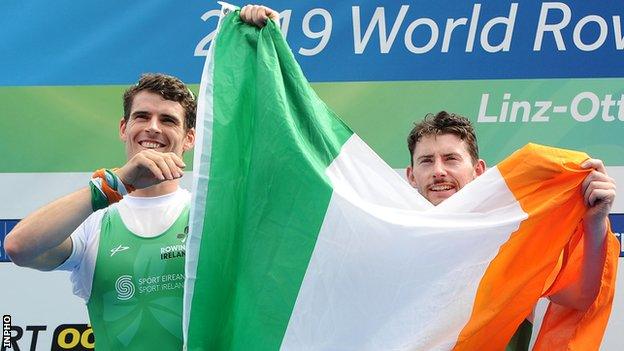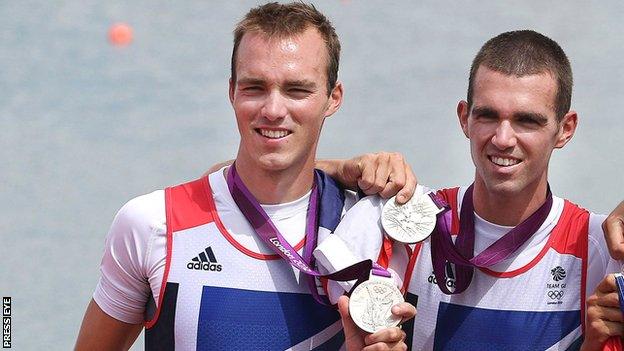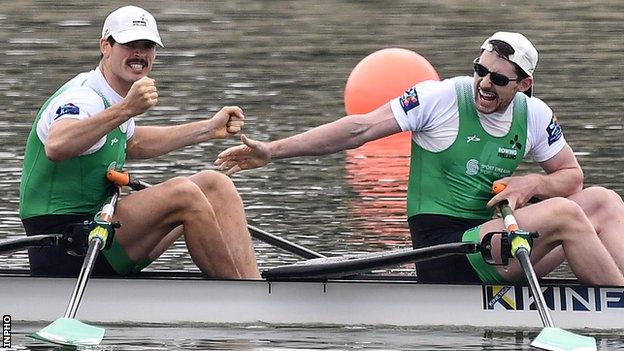Philip Doyle: Olympic contender on the battle between his rowing and medical career
- Published

Banbridge man Philip Doyle and partner Ronan Byrne clinched world championship double sculls silver for Ireland during the summer
"There's so much more to life than going to the Olympics. Yes OK, it's a measure and marker of a person's success but success is found in everything in life."
Banbridge rower Philip Doyle is talking about his mindset as he approaches a 2020 which will see him and double sculls partner Ronan Byrne earmarked as one of Ireland's big Olympic Games' medal hopes.
One could be forgiven for being a little cynical and assuming medicine graduate Doyle is attempting to play tricks with his own mind as next July's rowing regatta in Tokyo approaches.
But 45 minutes spent with this year's world championship silver medallist details a man for whom sport has "never been the be all and end all".
"My coaches struggle with that idea with me. We've had multiple meetings and they are saying: 'Phil…this is the Olympic Games….it's everything' and I am saying 'it's not'," the 27-year-old county Down man told BBC Radio Ulster's Sportsound Extra Time.
"It's not that people who don't make it to an Olympics are not a success. That's definitely an approach I don't want to have.
"To me it's not everything. But it's very, very meaningful."

Doyle says the achievements of Northern Ireland rowers such as the Chambers brothers Peter and Richard largely passed him by
'I didn't know much about rowing'
Doyle, who played youth hockey for Ulster and Ireland, only took up rowing at Queen's University in Belfast after watching the sport on television during the 2012 London Olympics.
But Northern Ireland rowing's pedigree amid the achievements of the likes of Alan Campbell and the Chambers brothers Richard and Peter largely passed Doyle by.
"I didn't know about the sport. One time, the sports psychologist at SINI [Sport Institute of Northern Ireland] was asking me how I assessed my competition and I said that I didn't know who I was racing until I raced them.
"After that when I started doing a few international regattas, I had to start googling names and World Rowing profiles.
"As time has gone on, I've learnt a bit more about people and obviously, I know those names now but I wouldn't have followed any of it back in the day.
"Sport wouldn't have been a huge thing in the house I grew up in. We never supported a soccer team or went to gaelic matches or rugby matches.
"It was kind of - do sport, be active, enjoy sport - and that is something I've struggled with in the Irish team because there are some people who are rowing encyclopaedias."
Doyle and Byrne's 'aggressive' plan yields World silver
But Doyle believes this approach works for him and double sculls partner Corkman Byrne.
"It's actually one of me and my partner Ronan's biggest strengths that we are totally unfazed by a lot of that.
"We know that you can't tackle somebody in rowing. You can't cut them off. There's nothing you can do expect mind games during a race. You just have to go faster during a race. It's very, very simple so I don't worry about what they are doing."
However, Doyle's philosophical approach to his sport does not mask a fierce competitiveness and indeed self-assurance.
In mid-July, the Irish duo caused something of a surprise by winning silver at the World Cup regatta in Rotterdam and immediately were convinced that they could achieve a similar performance six weeks later at the World Championships - even though several of the top boats had not competed in the Netherlands.
Ostensibly, the duo's task in Linz was to secure the top-11 finish to qualify an Irish boat for Tokyo but they agreed they would be aiming much higher.
'We're not leaving here without a medal'
"After our World Cup in Rotterdam, we were just dandering up to the car one day after a training session and I said: 'There are three check points we have to hit in this regatta. First of all come top 11 and as soon as that's achieved, then we come top six which is the A final and then we're getting a medal'.
"Ronan said 'I agree'.
"So we're not leaving without one? Cool.
"From that moment on, our momentum in training changed, out attitude changed. We were much more aggressive and hard-working.
"There was just a different energy about the two of us. I knew going into it [the World Championships]. Our coaches were saying 'we're not sure' and I said 'have some confidence in us'."
Doyle's belief proved to be well-founded as the Irish duo earned a sensational semi-final win to book the country's Tokyo berth in the class before a strong closing 1000m metres secured silver behind China in the final 24 hours later.
"We let everybody get away from us a good bit at the start. I think we were fifth coming through the 500m mark," the Banbridge man recalls.
"We left a lot of it to do in the second half of the race. I suppose you can argue is that the perfect race? Is that as good as we ever will be?

Philip Doyle (left) and Ronan Byrne celebrate winning their World Championship semi-final
"If we win gold some day, will that be the perfect race? It's very difficult. Did everyone else have their perfect race? It's hard to answer that question to be honest."
The breakthrough summer for the Irish duo was put in even sharper focus by the fact that Doyle walked away from the sport for a time last year as he resented the effect it was having on a medical career he loves.
"Whenever the coaches sat me down and told me to take some time out of my job and move down to Cork and row full-time, I was very reluctant and pushed back against that.
"I've always wanted to be a doctor. This was my first love. I'm not doing medicine because I like the idea of it. I was really enjoying work and training alongside it was quite difficult. So I stopped rowing.
"But then I went back to the gym and was doing pretty much the training that I had been doing and just thought, 'I have to go back'. So the medical career is on hold until 1 December next year."
Minimum 7,500 daily calorie intake
With Doyle invariably training for a minimum of seven hours a day, he requires a minimum daily calorie intake of 7,500 to maintain his weight at the correct level and jokes that his dentist is not happy at the amount of cookies he is consuming.
"It's a very fat dense diet purely to get the calories in.
"Everybody says it's so amazing that I can eat what I want and I am so thin but I'm thin because I'm training seven hours a day. The first two cookies are lovely, don't get me wrong, but the ninth and the 10th," adds the rower, shaking his head.
Doyle wonders aloud what his late father Eamonn, a much-loved BBC Northern Ireland TV cameraman, would make of it all.
He didn't live to see Philip's success on the international stage after dying of pancreatic cancer in 2015.
"His wishes were always for me to keep going with life and not to let his illness slow me down.
"But I did all my exams through that. Studied in the hospice beside his bed. Brought home my British Universities medals to show him while he was in the hospice.
"I was called home from a training camp when he got quite unwell. It upset him to see it pulling me out of that."
Doyle's training regime won't be quite an intense as normal over Christmas although he has a rowing machine in the family's garage which mother Una has started availing of as well.
"I'll be training over Christmas but will get a bit of downtime. Mum will be woken up in the morning with the sound of the fan whirring away in the morning when I am in the garage."